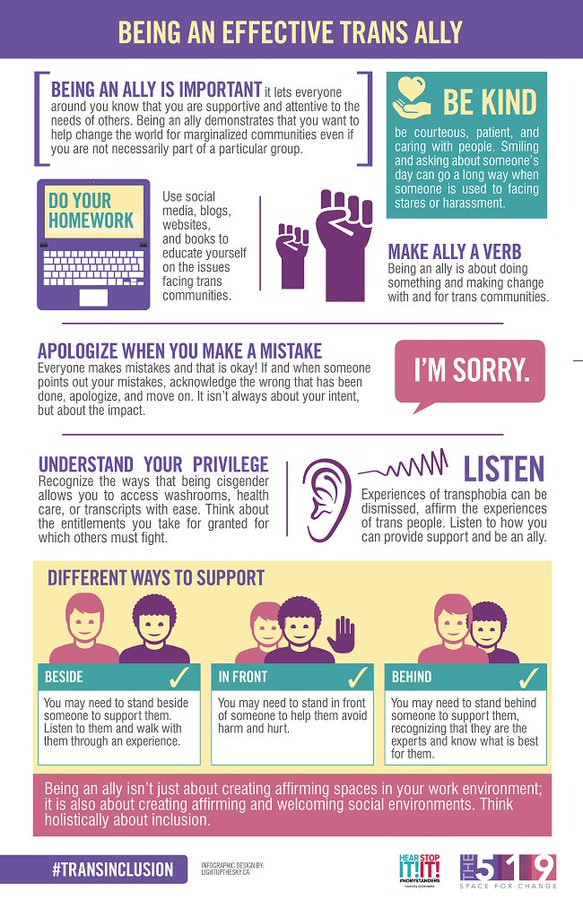Talking to fellow progressives about trans ideology
Over the course of dozens of one-on-one conversations, here's what I've heard over and over again:
- I didn't think I was allowed to say that.
- That never made sense to me.
- It always seemed so regressive to me.
- I thought I must be missing something.
- I didn't think it was my place to question it.
- I wasn't sure how to talk about it.
- I didn’t know what I could and couldn’t say about it.
- I felt like a bad person.
- Something didn't feel right to me but I just wasn’t sure...
Good-hearted, liberal-minded people want to do the right thing by trans people. But an extreme version of the ‘trans rights’ agenda became part of the progressive package—a package many progressives pick up and carry around without ever opening it to examine the contents.
Everywhere progressives turn, they hear what's expected of a good trans ally: listen [defer] to trans people, educate yourself [self-indoctrinate], amplify trans voices [be quiet], be kind [don’t be honest], and remember: your intent doesn't matter.
Would-be allies are expected to accept quite the menu of questionable claims and demands:
- Believe that self-declaration magically turns a man into a woman
- Accept the medicalization of younger and younger children
- Accept the redefinition of your sex class and personal identity
- Speak in an unfamiliar language that constricts what you can express and even think about sex and gender
- Accept that, as a "cis" person, your existence mysteriously contributes to the oppression of trans people
- Interpret changing everything about yourself as radical self-acceptance, etc., etc.
But allies quickly learn how to manage their questions and doubts about what they’re being asked to support:
- Just because you don’t understand X doesn’t mean there’s anything wrong with X. [Doesn’t mean X is OK, either…]
- As a “cisgender” person, you might not be capable of understanding X. That doesn’t absolve you of your responsibility to support trans people.
- X is supposed to make you uncomfortable. Discomfort is a sign that you need to challenge yourself and grow.
- If you were a better ally, you’d understand why X is necessary and why it’s offensive to question X.
- "Repeat after me: trans rights are human rights! Transwomen are women!" And so on.
You learn to discount your own intuition and second-guess your perceptions, when your intuition and perceptions contradict trans dogma. You struggle to learn a language that’s unfamiliar and always shifting, so you never know what you can and can’t say. And this new language makes it almost impossible to think and communicate clearly about the concepts you’re expected to accept. And you watch other people ask reasonable questions and make innocuous—even supportive—comments and pay the price for their ideological noncompliance: losing friends, losing work, weathering rape and death threats. An Arctic chill settles over the whole subject. Is it any wonder many progressives hesitate even to broach the subject, or do anything other than nod along?
When you sit down for a one-on-one conversation, you have an opportunity to reject the taboos, drop the language games, and speak plainly about what’s going on.
As soon as people feel free to use familiar language and ask questions without fear of being monstered or canceled, it turns out most progressives have a lot of questions and doubts about the trans agenda, questions like...
- Does everybody have a gender identity?
- What are kids being taught about gender id in school?
- Why did this all seem to have come out of nowhere?
- Is transition safe?
- What's going on with a rush of kids identifying as trans out of the blue?
- Is it fair for male athletes to compete against females?
- Why are the new euphemisms for 'female' so degrading to women?
- Why are trans demands so lopsided, with much demanded of women and very little demanded of men?
- Why do ideologically-noncompliant women take so much more heat from trans activists than violent men?
- Why are women’s movements being co-opted?
- Does anyone abuse self-id policies?
- What's the difference between Rachel Dolezal and Caitlyn Jenner?
- Why does gender id come up all the time, when trans activism doesn’t really have anything to do with [name your pet progressive issue]?
- Does gender id belong at work?
- Isn't it all kind of sexist and regressive?
- Why is it so hard to talk about any of this?
This is exactly why trans activists must maintain a chill on the subject, insist on language that obscures what's going on, and punish anyone who deviates from the party line. As soon as people can speak freely and openly, it falls apart.
The most effective way to push back? Open up to people. You’ll find a few rabid ideologues but most of your fellow progressives have questions and concerns about the gender agenda. Model the kind of conversation we need to have as a broader society, one person at a time.




